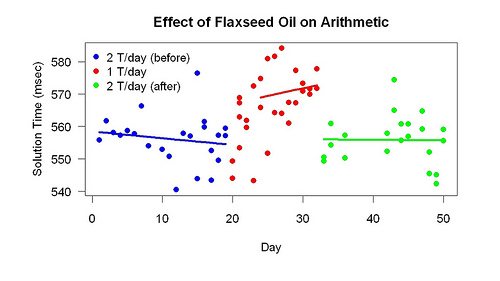… is the title of a New York Times Magazine article about the ketogenic diet, a treatment for childhood epilepsy, which I’ve blogged about several times (here, here, here, here, here). It’s a very-high-fat diet. It interests me for two reasons: (a) It connects a high-fat diet with proper brain function, as my self-experiments have done. A curious feature of the ketogenic diet is that it isn’t permanent. After several years the child can go off it. My self-experimentation suggests that Americans eat far too little of certain fats. Perhaps eating enough of these fats would prevent childhood epilepsy. (b) It shows how someone who cares enough — in this case, Jim Abrahams, whose son had epilepsy — can be more effective than professional researchers and doctors. Abrahams rediscovered the diet. He saw its value, the professionals didn’t. I’ve argued that this is part of why my self-experimentation found new solutions to common problems: because I had those problems. I cared more about finding a workable solution than researchers in those areas, who had several other concerns (publication, funding, acceptance, etc.).
The details of the article reminded me of something I learned in the BBC series The Story of Science. For hundreds of years, medical students were told, following Aristotle, that the liver has three lobes. It doesn’t. You might think that examination of thousands of actual livers would have dispelled the wrong idea, but it didn’t. The article contains many examples of doctors ignoring perfectly good evidence in favor of nonsense they read in a book or heard in a lecture. Epilepsy is easy to measure. If a child has 100 seizures per day, and has been having them at this rate for years, and this goes down to 5 shortly after he starts the ketogenic diet, and goes up again when the child goes off the diet, there is no doubt the diet works. As early as the 1930s, this had been observed hundreds of times. This was overwhelming evidence of effectiveness. Doctors ignored it, probably based on the modern equivalent of the three-lobed liver. They complained, according to the article, that there was “no evidence it worked” or that the evidence wasn’t “controlled” or “scientific” (whatever that means). A study published in 2008 “answered doubts about keto’s clinical effectiveness” — as if doctors needed the equivalent of a very-large-type book to be able to read what most of us can read with normal-sized type.
According to the article, “by 2000, more people were asking about keto, but most pediatric neurologists still would not prescribe it” — as if the parents needed the approval of their doctor to try it. You don’t need a prescription to buy food.
Thanks to Tim Beneke, Michael Bowerman, Alex Chernavsky, David Cramer, and Peter Couvares.
